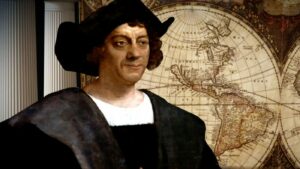What is Columbus Day?

Columbus Day is a national holiday in the United States that honors Christopher Columbus’s arrival in the Americas on October 12, 1492. Observed on the second Monday of October, the day has significance for Italian Americans, who have long advocated for its recognition. The impetus for this observance stemmed from a tragic event in 1891 when a mass lynching of Italian Americans occurred in New Orleans. In response, U.S. President Benjamin Harrison designated the 400th anniversary of Columbus’s landing as a national holiday in 1892, intending it as a one-time celebration. However, in 1937, President Franklin D. Roosevelt officially established Columbus Day as an annual holiday.
What is Indigenous Peoples Day?
Indigenous Peoples’ Day is a holiday in the United States that celebrates the Native populations of America, many of whom faced violence, displacement, and exploitation starting with Christopher Columbus’s arrival in 1492. Depending on the state, local government, or institution, Indigenous Peoples’ Day may be observed in lieu of Columbus Day or alongside it on the second Monday in October. In 2021, Joe Biden became the first U.S. president to officially recognize Indigenous Peoples’ Day.
Columbus Day is a holiday in the United States that originally took place on October 12 but has been celebrated on the second Monday in October since 1971. It commemorates Christopher Columbus’s landing in the Americas on October 12, 1492.
Although Christopher Columbus’s explorations were funded by Ferdinand and Isabella, the joint monarchs of Aragon and Castile (now part of Spain), he was originally from Genoa, Italy. Over time, Italian Americans embraced the mission of honoring his accomplishments. The 300th anniversary of his landing was celebrated in New York City in 1792 by the Society of St. Tammany, also known as the Columbian Order. This benevolent fraternal organization was founded in 1789 to promote patriotism and democratic principles.
The direct impetus for establishing the anniversary of Columbus’s arrival as a national holiday was the mass lynching of 11 Italian Americans in New Orleans in 1891. This event, one of the largest lynchings in U.S. history, took place amid a climate of widespread anti-immigrant and anti-Italian sentiment in the country, just one year after the murder of the city’s police chief, for which the Italian community was blamed. In total, 19 Italians were charged in the case, but the flimsy evidence was revealed when six of the accused were acquitted and three others received mistrials.
Before the remaining accused could be tried, a mob invaded the city’s prison and killed 11 Italians, some of whom were not among those charged. This brutal event strained diplomatic relations between Italy and the United States. In an effort to appease the Italian government, President Benjamin Harrison declared the 400th anniversary of Columbus’s arrival a national holiday in 1892, initially intending it as a one-time celebration.
In the latter half of the 19th century, Columbus Day began to be celebrated in cities with significant Italian American populations. In 1937, it was established as an annual federal holiday through a presidential proclamation. The day is now marked by parades, often featuring floats representing Columbus’s ships, as well as public ceremonies and various festivities.
By the quincentennial in 1992, Columbus Day had evolved into an opportunity to discuss the European conquest of Native peoples. Many individuals began to voice objections to celebrating the event and proposed alternatives, including Indigenous Peoples’ Day.
Columbus’s landing is also commemorated in Spain and Italy. In many Spanish-speaking countries in the Americas, it is observed as Día de la Raza (“Day of the Race” or “Day of the People”). Instead of celebrating Columbus’s arrival, many people who observe Día de la Raza honor the Indigenous peoples of Latin America and the rich cultures that evolved over the centuries as their heritage blended with that of the Spanish explorers who followed Columbus. In some countries, religious ceremonies play a significant role in the celebrations.


